Advocacy
Sustainable, equitable progress in the agreed global development agenda cannot be achieved without the inclusion of persons with disabilities. Having been isolated and largely rejected by families and communities, explosive ordnance survivors find a place within Disabled Persons Organisations (DPOs), where advocacy enables them to feel valued, find a sense of identity and from which they can help others like them.
Advocacy campaign in Uganda as a Party appears to be performing under par on its track to implementing its obligations, such as clearance, assistance to victims, mine risk education and treaty reporting, as explicitly required by 2008 Convention on Cluster Munitions and Mine Ban Treaty Article 7 report.
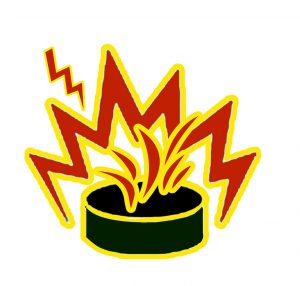
The Republic of Uganda signed the Mine Ban Treaty on 3 December 1997 and ratified on 25 February 1999, becoming a State Party on 1 August 1999. However, Uganda has not submitted a Mine Ban Treaty Article 7 report since 2012; its last Mine Ban Treaty Article 7 report (for 2011) did not provide information on victim assistance. Uganda last made a statement on victim assistance at the Mine Ban Treaty Fifteenth Meeting of States Parties in Santiago in November 2016. This is not a positive part of the country in its Treaty Reporting obligation.
Advocacy campaign to Ban mine by ICBL-CMC partners in the different State Parties globally must continue till the job is done!
Ban Cluster Munitions
With regards to the 2008 Convention on Cluster Munitions: Uganda participated actively in the Oslo Process that produced the Convention. It hosted a regional meeting in Kampala to build support for the Convention in September 2008, and signed the Convention in December 2008. National legislation for domestication of the Convention has been drafted but has yet to be adopted. In a nutshell, Uganda as a Party appears to be performing under par on its track to implementing its obligations, such as clearance, assistance to victims, mine risk education and treaty reporting, as explicitly discussed above.
Cluster Munitions continue to hurt global communities in different parts of the world making it our duty to carry on with advocacy campaign to Ban mine alongside other ICBL-CMC partners!
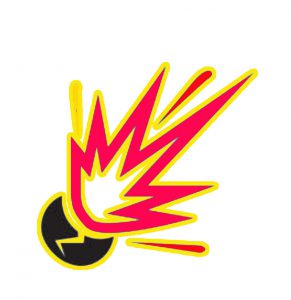

Mine Risk Education
Although Uganda declared itself mine-free in 2012, explosive remnants of war (ERW) still contaminate the country. To prevent resulting deaths and injuries, ERW risk education must be accessible to civilians. Communities are not aware of risks of landmines and other explosive remnants of war. The Uganda People’s Defense Force (UPDF) and the Uganda Police Force (UPF) provided all demining personnel to Uganda Mine Action Steering Committee (UMAC). Police Demining or Bomb Squad Department and the Army are not sufficiently facilitated by Government to fully carry out their duties.
Recent news of explosive ordnances being found, injuring and even killing people in Uganda gives us the more reason to continue with Risk Education Awareness sessions in communities and schools.
Wheelchair Basketball
While not all persons with amputations will aspire to become elite athletes, those who participate in a sport and want to take their performance to the next level may find the maze of training and fitness information difficult to navigate. We were part of Uganda’s first Wheelchair Basketball team with two amputees male and female at the elite level playing Team Uganda East African Wheelchair Basketball Tournament, Kasarani 2019, Nairobi kenya.

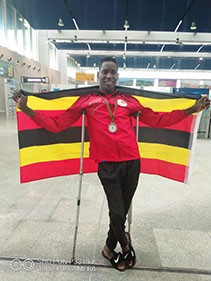
Amputee Soccer
Many times persons with amputation are not always informed or aware of sport events in their communities. We are introducing amputee soccer in partnership with UNAPD with support from Danish Paralympic Committee to empower persons with amputation, and any kind of physical constraint, to use physical fitness, sport and recreational activity to be able to reach their full potential and improve their overall quality of life.
Adaptive Soccer
While not all persons with amputations will aspire to become elite athletes, those who participate in a sport and want to take their performance to the next level may find the maze of training and fitness information difficult to navigate. Participation in varying activities has a profound effect on an amputee’s life. It has been shown that involvement in adaptive sports increases the quality of life for persons with disabilities by increasing self-esteem.
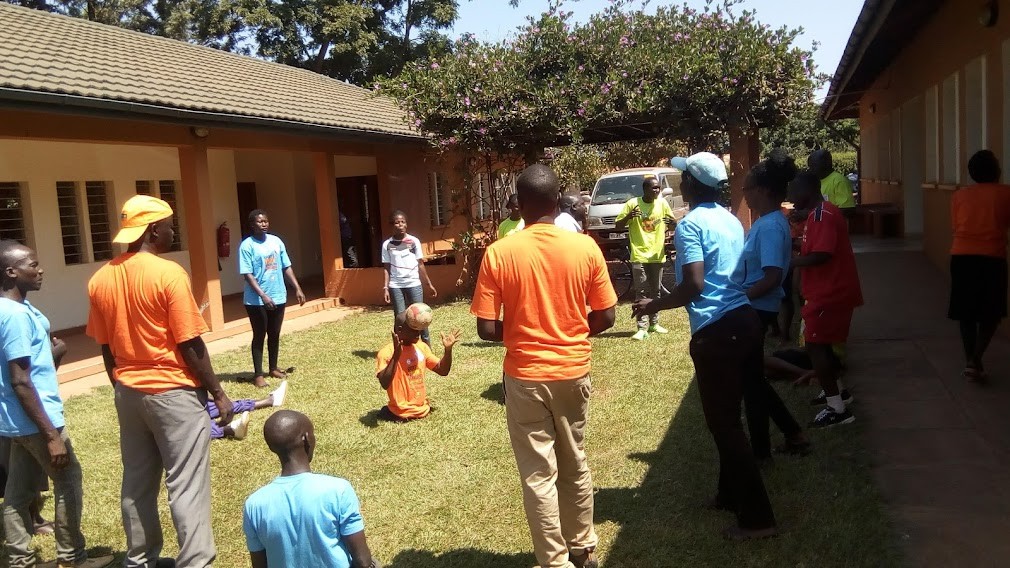
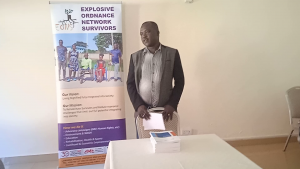
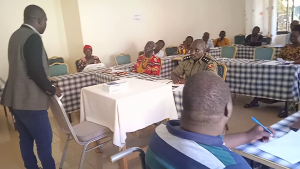
Mr. Otim Ocogo, International Criminal Court (ICC) Field Outreach Officer gave overview of ICC presence dating 2002 when Uganda ratified membership of the Rome Statute of ICC. Uganda government then recounted the gravest impact of war crimes allegedly perpetrated by the Lord’s Resistance Army (LRA) rebels in northern Uganda. This case was referred to the ICC in 2003. The office of the prosecutor decided to initiate proceedings for arrest of top five (5) LRA commanders Joseph Kony, Vincent Otti, Rasta Lukwiya, Okot Odhiambo and Dominic Ongwen in 2004, as the persons supposedly most responsible for the atrocities recorded.
Arrest warrants was issued 2005. As fate would have it, Raska Lukwiya died 2006, Vincent otti 2008, Okot Odhiambo 2010, leaving Joseph Kony still at large and only Dominic Ongwen convicted February 4 2022 to 25 years’ jail in The Hague.
Dominic Ongwen trial commenced 2015. Case files alleged that as Commander of the Sinai brigade of LRA Ongwen was responsible for attacks at Lukodi IDP (Gulu district), Abok IDP (present day Oyam district), Odek IDP (home of Joseph Kony and present day Omoro district) and Pajule IDP (present day Pader district).
Charges against war crime and crime against humanity levied against Ongwen included killing, abduction of children, abduction of women, sexual slavery, child labour, child soldiers, etc amounting to 70 counts. He was found guilty of 61 counts out of 70 in the February 4 2022 conviction. May 6 2022 25 years of imprisonment
Ongwen’s legal team appealed the conviction and sentence. The defense presented 110 grounds of appeal on court session hearing April 14-18 2022. The judges took time to review the defense and today December 15, 2022 1:30 p.m. East African Time five (5) months later will be responding to Ongwen’s appeal. Should there be a no-guilty or no conviction; there won’t be reparations for the war victims in northern Uganda. Nonetheless, if the earlier conviction is upheld; reparation for war victims will be the next line of discussion through court proceedings and order.
Rwot Okwonga Adek , of Pageya Clan, noted that pollution of our farmland with explosives is the biggest adversary to our peasant population. Complete ban of mine or cluster munitions or any other weapons for war might be insurmountable. We applaud ICBL-CMC advocacy efforts leading the campaign to reduce risk of such devastating effects of the concealed weapons in our global community.
The Rwot raised a concern in regard to implementation of reparations in the event ICC orders after the conviction of Ongwen. He recollected how PRDP he and the team at the 2005 Juba peace talk negotiated and recommended its operation in only the war affected arears. PRDP was taken to Kampala City and rolled out in 55 districts and 9 municipalities. Each of the 64 local government administrative units consequently were awarded the same budgets. Perhaps the stagnant development of Acholi Sub region traces its origin from bad implementation of PRDP. Won’t ICC reparation suffer similar fate?
In response to Rwot Okwonga Adek’s fears, Mr.Ocogo, stated that unlike PRDP negotiated during the Juba Peace talk, reparation awarded by ICC is scheduled to be implemented under legal court proceedings likely to involve grassroots consultation and other relevant stakeholders systematically. Rehabilitation of infrastructures, restitution for victims and humane sensitive considerations shall be options ICC will undertake to award reparations.
Mr.Ocogo however, cautioned the community for over relying on the supposed reparations settlement to better their lives in northern Uganda. He quoted an Acholi saying “Free charities usually do not yield much compared to what you strive on yourself…” Stone soup theory of live
Referencing an earlier war that devastated Luwero district in early 1980’s, Mrs. Margaret Orech Arach, mentioned that government is on record for compensating victims in the area yet claims kept coming time and again!
Equally, here in Acholi Sub region, we have had the issue of war debt claimants seeking for compensation of damaged properties and lost cattle. It is also alleged that government has been remitting such settlements but it appears some of the eventual beneficiaries were either ‘ghosts’ or crafty gang of a few greedy masqueraders, added Rwot Okwonga Adek. Unlike in developed countries, the sarcasm in Uganda is that civil servants are the multi-millionaires and you asked yourself how they able to do that. Shall reparation when awarded, be transparent and safe?
ICC allotted Trust Funds for Victims grants for temporary assistance the past five (5) years where some organizations through it were able to provide medical rehabilitation and victim assistance including prosthesis for amputees handled by AVSI.
Statistics put it between 60,000-90,000 victims of the LRA war responsible for plunging the region into abject poverty. Some reflections of these is the number and nature of crime reported at police. Youths shun traditional work in the garden opting to go drinking through the day. Little education attainment in most households is setting the future generation challenges of even acquiring blue collar jobs within their parishes and Sub Counties. Extenuating effect of the long conflict could be a sitting time bomb for the community and nation, he decried.
“Ironically, reparations will only be awarded to only those victims directly linked to ongwen registered areas of operations as prosecuted namely; Lukodi, Abok, Odek and Pajule respectively”, revealed Mr. Ocogo. It is no secret Atiak massacre, Barlonyo massacre, kitgum Matidi and several other atrocities were committed during the war, yet the Rome Statute cannot legally order such reparations.
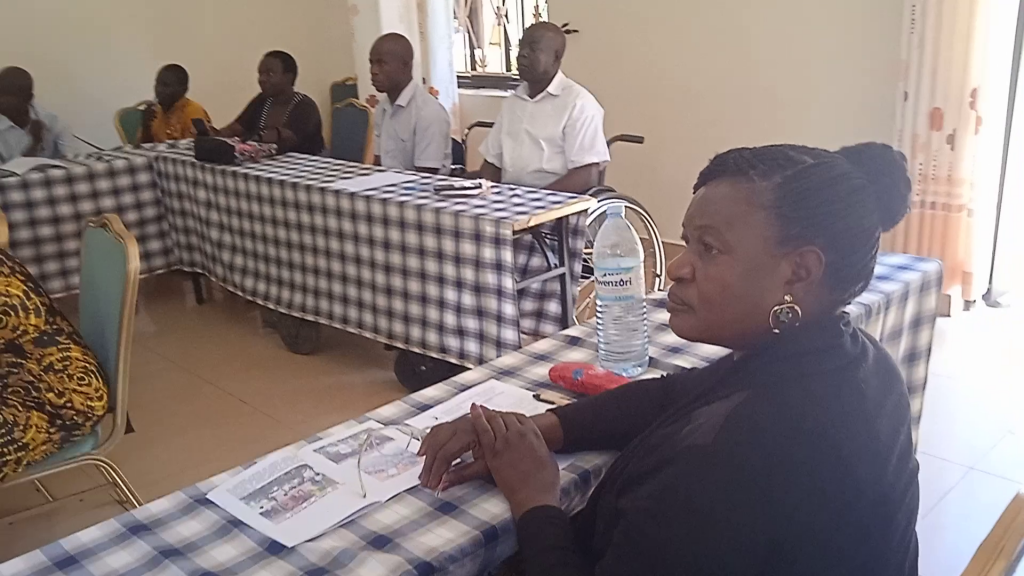

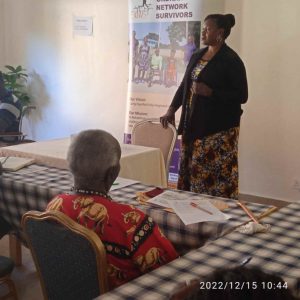
December 15, 2022 Stakeholders Meeting at Dove Nest Hotel is an advocacy session carried out to disseminate findings on the state of current situation of explosive remnants of war (erw)/explosive ordnance (eo) in Uganda, specifically Acholi Sub region. Our target audience for sharing this fact finding were the team of reporters, journalist and other relevant stakeholders as an exercise to contribute to the State Monitor report 2022/3.
The day’s activity consisted of presentation of findings from EONS, remarks from ICBL-CMC Ambassador, remarks International Criminal Court (ICC) Field Outreach Officer, question and answer sessions.
In attendance were representation from the media house, Disabled Persons Organisations (DPOs), Cultural Traditional leaders, Religious leaders, NGOs, Uganda Police Force, Local government leadership, survivors of explosive ordnance, International Criminal Court (ICC) representative, ICBL-CMC Ambassador and area Member of Parliament at the State National Assembly.
Presentation of the findings from the survey purposely in selected Sub Counties from two districts, revealed that several UXOs have been found scattered in different locations within the Sub Region.
With evidence of 30 unexploded ordnances (UXOs) in one Sub County in Nwoya alone and over 10 UXOs in one Sub County in Gulu district. Some of the UXOs were reportedly disarmed by the military, Uganda Police Bomb Squad or even the community applying the crude setting ablaze of the ordnance. Some of the Explosive Ordnances (Eos) were temporarily secured under tree stumps, anthill or presumed safe spaces where they were found lurking.
In a nutshell, it is admissible that explosive hazards still litter vast swaths of land across Acholi Sub region that could be used to produce food to fuel economic growth.
After a fruitful dialogue, the meeting adjourned with closing remarks from Gulu City Woman Member of Parliament, Honourable Mego Aol Betty Ocan who pledged advocacy to voice this concern to relevant platforms she subscribes to including the Acholi Parliamentary Group and Greater North Parliamentary Group among others.
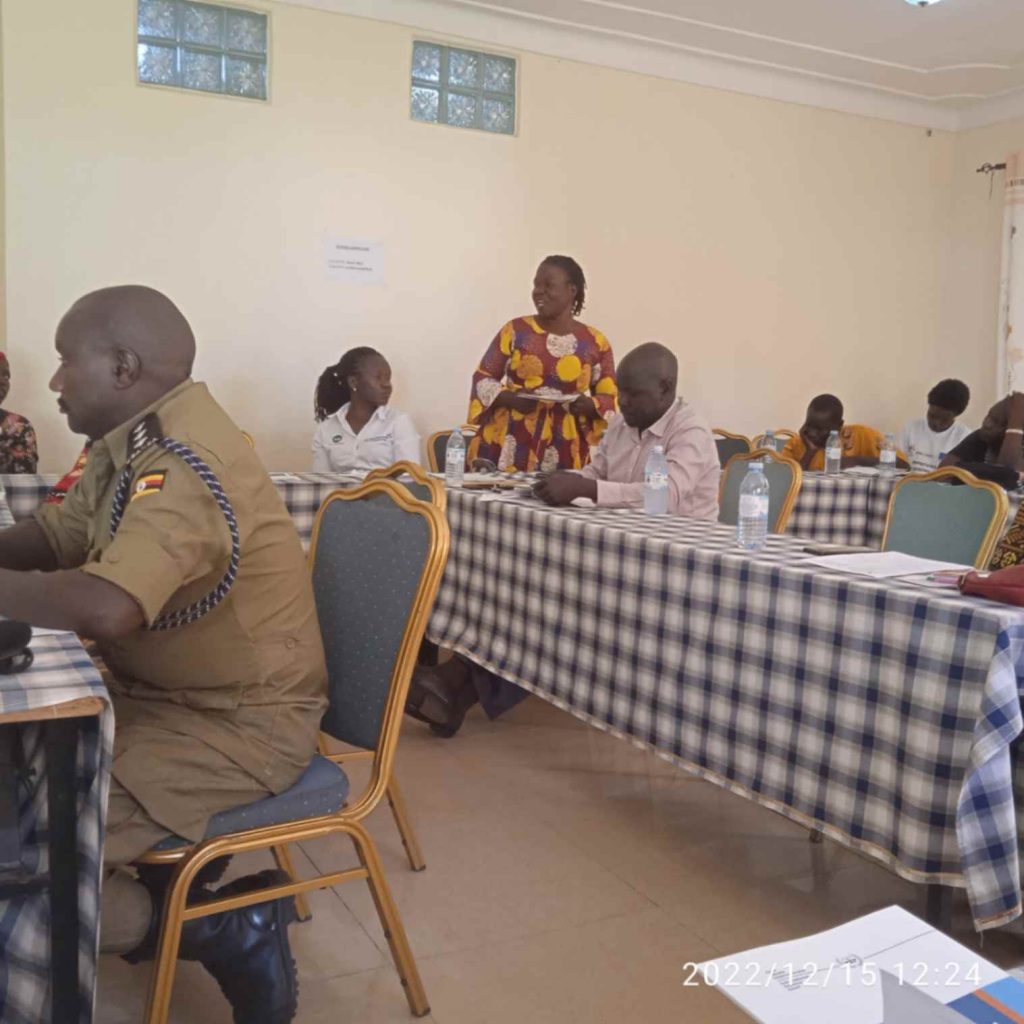
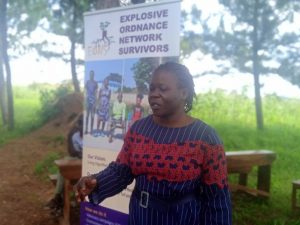
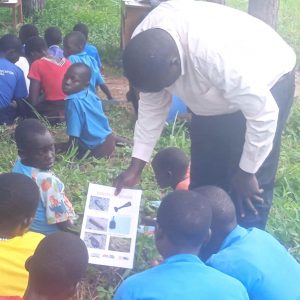
This report provides the key highlights of advocacy activity events carried out at Bulkur Primary school, Omel Sub county Wednesday November 23, 2022.
In his concluding remarks during a previous dissemination session on explosive ordnance risk education with local leadership August 2022, the chairperson Omel Sub County made an appeal for more community dialogues targeting school children in the available primary schools in the Sub county.
The Purpose of the dialogue was to disseminate explosive ordnance risk education to primary school children scheduled right before school closes for a very lengthy holiday.
Uganda Peoples Defense Forces (UPDF) Atoo Hill Barracks commander and his comrade did discuss the risk potentially posed by different images of weapons printed in posters.
The day’s events consisted of two (2) hours testimony of a landmine survivor, welcome remarks by host, presentation of explosive ordnance risk education awareness and concluding remarks from the Sub County chairperson. There were over 250 participants including 230 pupils in attendance.
Ms. Piloya Monica, Chairperson EONS and a landmine survivor narrated a brief of what explosive ordnances can do. Loss life or when lucky; carry permanent signature manifest as disability. Ms. Monica showed prosthesis on her right foot enabling her to move upright to the amazement of most who had never seen them. Doubling as a mother and political leader, the chairperson counselled children to help parents during the long holiday and make sure they return back to school the following academic year. “Her advocacy equally made emphasis for the girlchild to avoid early marriages and unnecessary dropping out of school due to bad peers.
Lt. Ismail and his 2ic picked each posters with pictures of explosive ordnances explaining in details the potential kill rate when encountered both in combatant front or lurking in snare. Common weapons found in the country were 60mm Anti-tank and 80mm Rocket propel grenade, stand grenades, and bullets. He cautioned children to step no closer once they have set eyes on such anomalous objects while hunting, grazing, digging, or any activity leading them to such sites. The Lieutenant urged children to immediately report to relevant authorities beginning with any close elderly person, parents and leaders. Children were also told to report findings of any non-explosive objects familiar to them such body armour, helmet, knives, uniforms, etc; because they are not for civilians. The Information Educational Communication (I.E.C) materials were also printed in small fliers which was distributed to the children as reference even they return home. Larger poster remained in school and shall become talking images on the school walls now and in the future.
The dialogue comprised a participatory approach which included structured presentations, Question & Answer sessions; but mostly instructional. For efficient deliberations the facilitators felt it was important to deliver an overall presentation to cover basics of explosive ordnance risk education especially for infant audience.
RECOMMENDATIONS
- Once identified report to the authorities through those chains of command till the legally qualified personnel comes to do actual disarming or disposal of the explosive ordnance.
- Children should go and continue to create awareness of the risk education with peers and their immediate families.
- An appeal was made for more community dialogues targeting two more primary schools in the Sub county.
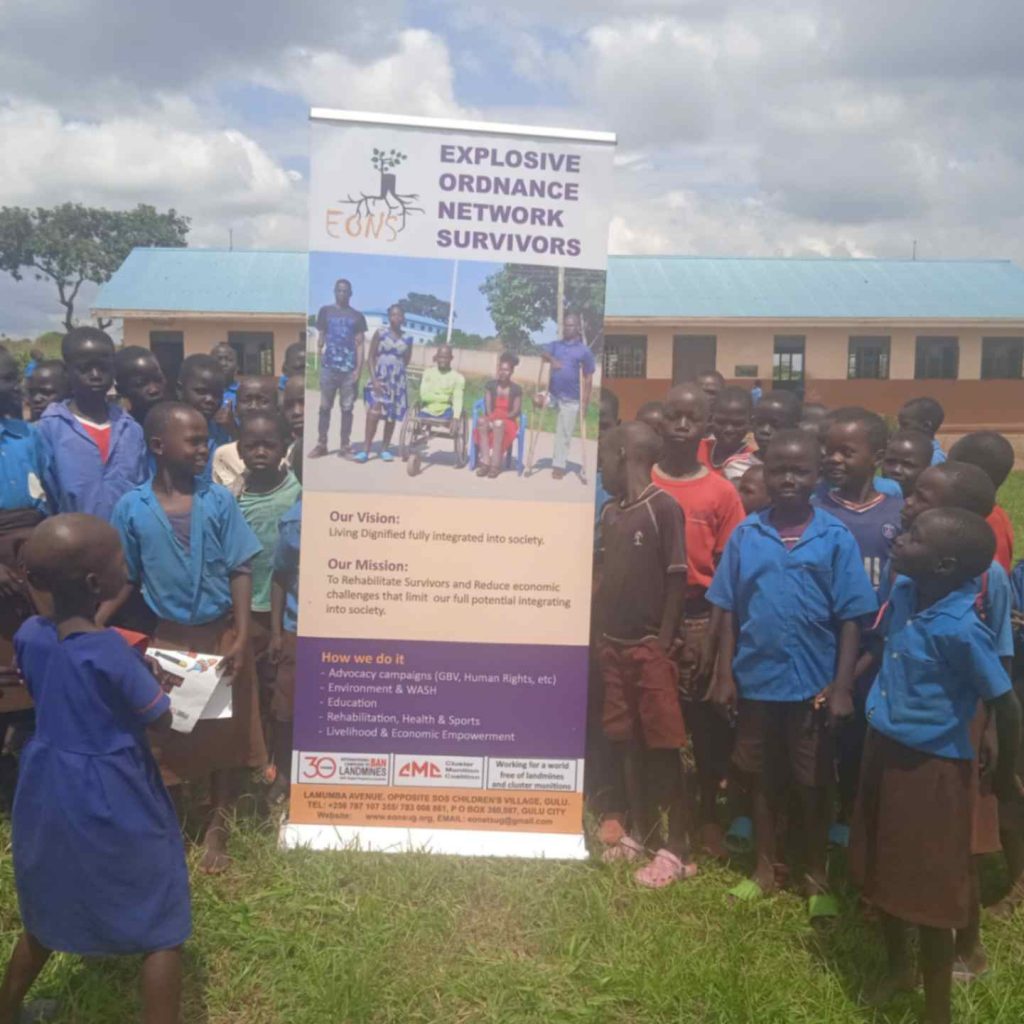
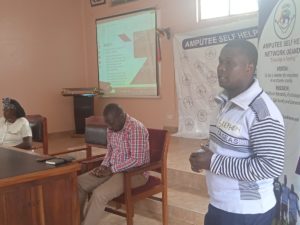
Participative advocacy or stakeholder advocacy through which people, articulate their own needs and desires, gain the confidence and ability to influence decisions which will affect their own future.
Stakeholders in our advocacy work are those individuals who have an interest in seeing the goals of the advocacy work being reached, or not. That is why we are breaking this large group down into smaller categories of like-minded people in order to recognise where participants fit into the campaign.
So we seek allies because they will benefit directly from the changes we are trying to bring about and beneficiaries whose lives will be improved by the successful achievement of our advocacy goals even as a passive stakeholder.
EONS had the privilege to host Amputee Self-help Network Uganda – ASNU an affiliate organization founded by amputees driven by a passion of uplifting persons dealing with post traumatic stress disorder (PTSD) and other challenges related to the traumatic loss of part of their body and main stream PWD, by using their experience to support each other psychologically, psycho-socially through peer to peer support and engagement in adaptive sports as tools of rehabilitation, self-help and empowerment to be productive members of the society.
Together with survivors, representation of Uganda Landmine Survivors Association (ULSA)) and members of the local government of Gulu district and City were able to echo the universal call to Ban landmine and cluster munitions.
We have a goal and an audience to present our messages. We seek alliance to deliver and we are a civilian amputee support group, survivors of landmines and explosive ordnance found in Uganda. So much enshrined in the Victim Assistance is not adequately delivered. We are walking the first steps to our State government for some answers so that we could meet each other somewhere.
The International Campaign to Ban Landmines and Cluster Munition is a huge success! Article 5 Mine Ban Treaty obligations, Mine Clearance achieved by Republic of Uganda coinciding with the Twelfth Meeting of States Parties (12MSP) December 2012.
46 mined areas covering 1.6km2 clearance operations found and destroyed 4,314 antipersonnel mines, 42 air bombs and 15 UXO. Additional 9,273 UXO and 20 antivehicle mine destroyed during operations.
Unfortunately, the total number of mine/ERW casualties in Uganda is not known. Estimates by December 2016, put it at 2,792 casualties (533 killed; 2,259 injured). 14 casualties were registered by December 2016. A recent study we carried out August to October 2021, disclosed a 69 year old lady injuries leading to right leg amputation.
As long as mines infest nations countless casualties leading to death, injuries, disabilities, destructions, mourning, and millions of dollars spent of reconstructions instead of sustainable global development.
Victim assistance enshrined in the two instruments of international humanitarian law, The Mine Ban Treaty (MBT) and the Convention on Cluster Munitions (CCM) remains the Achilles heels Uganda is yet to overcome.
Republic of Uganda is feeling like the Pearl of Africa again thanks to the International Campaign to Ban Landmines and Cluster Munition with generous support of affluent donors worldwide.

Some survivors remain in dire need for routine medical rehabilitation and treatment begging for government to again prioritize budget allocation towards the orthopedic departments. Something like insurance card specifically for survivors to get professionally help from trained surgeons and not just general medical practioners.
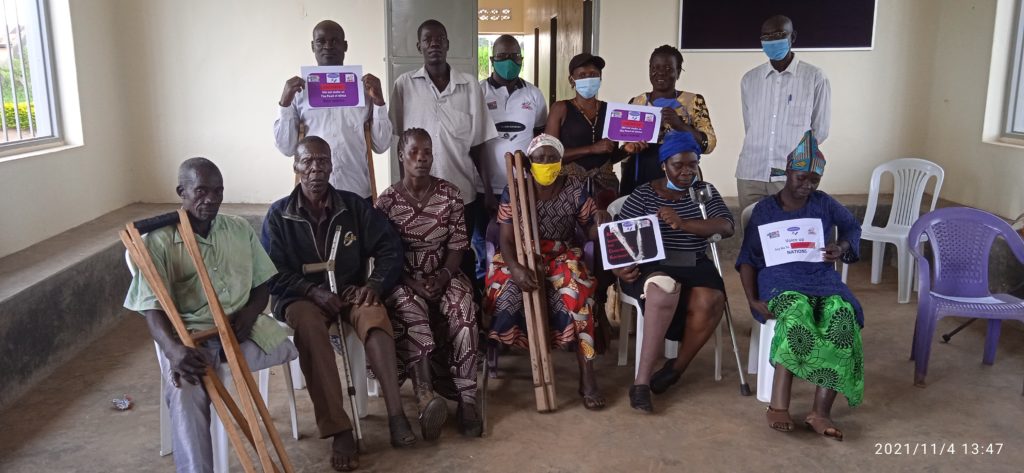
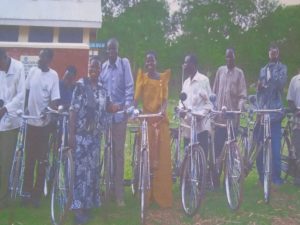
It is a little over ten years since the guns fell silent in Northern Uganda following the signing of peace talks between the government and the Lord’s Resistance Army (LRA) rebels in the Southern Sudan capital, Juba. But the scars are still fresh for many victims of the 20-year war.
Most of these survivors used to reside with relatives or friends but major problems piled up upon their return to their homes in the villages where immediate survival needs formally catered for by national, international and non-governmental organizations were withdrawn. Survivors begun facing very difficult conditions with no special attention being given to their emotional and psychological needs. In light of the above, our project is an advocacy campaign needed to intervene for a period to equip the majority of survivors in this post war-ravaged Northern Uganda to cope with their emotional and psycho-social needs.
Effect of amputation has proven to have serious psychological, social and economic impact in the lives of human being, with people losing many physical functions and abilities that were once taken for granted. The development of major depression can also be a further complication, and therefore, identification and monitoring of suicidal tendency for some survivors require close attention by the treating team. Our program was designed to help survivors to improve mental health functioning by helping them cope with their symptoms and ease their transition from dejection to normal life. This involves incorporating individual counseling for survivors, conjoint family therapy, and psychoeducational group for spouses, children and guardians. Ideally, when families, spouses and children are made to be part of the session, it automatically implies community takes an interest hence moral support from local leadership. So purposefully our survivors network seeks to provide psychosocial and family services to survivors suffering from stress and depression.

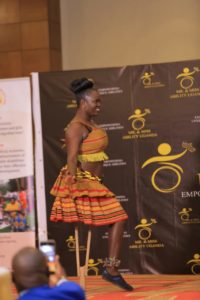
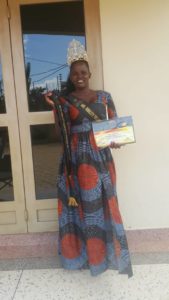
Playing wheelchair basketball afforded Eveline travels with her peers for competitions. She also had the honour of representing Uganda country in the inaugural East African Wheelchair Basketball Championship where she emerged Uganda’s best player in the finals and second top scorer.
Eveline after amputation Eveline got exposure in the new environment where advocacy opportunity enabled her contest in Miss Tourism Northern Uganda Miss Tourism 2018. She finished first runner up in the national competitions showcasing dancing her cultural traditional rhythms.
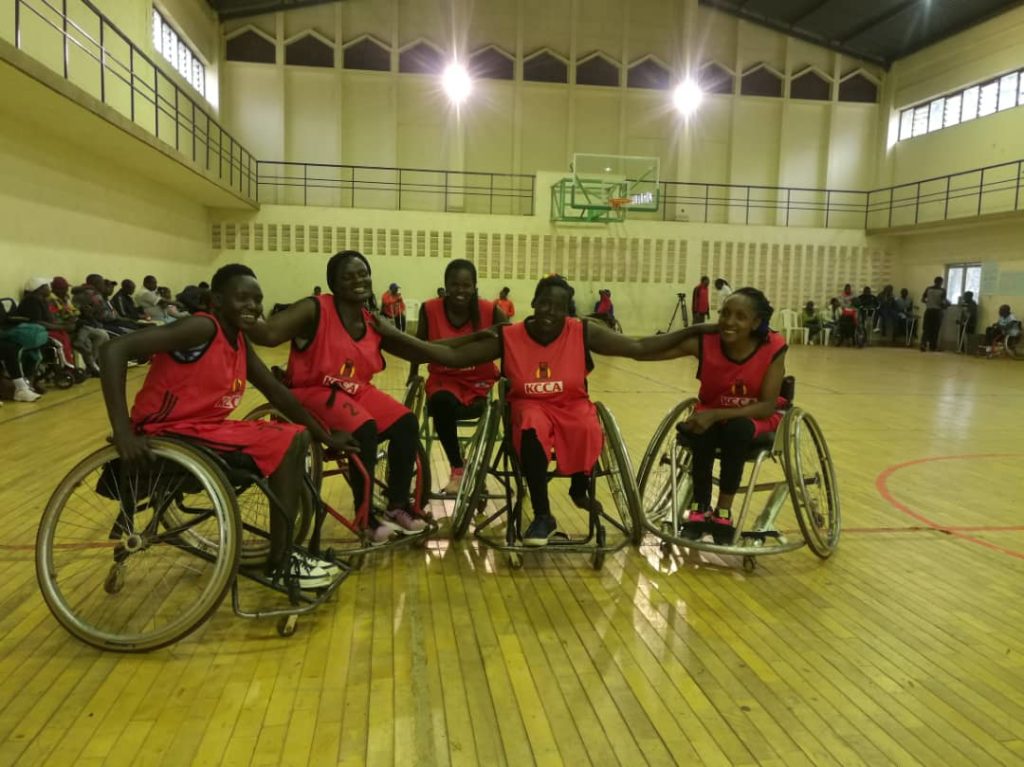
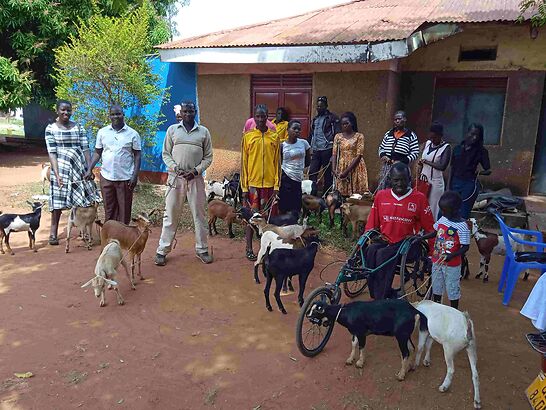

The Project benefitted 15 youths with disabilities comprising of both survivors (amputees) and other physical disabilities and one Intellectual disability. There were 8 females and 7 females. Each recipient received two (2) female goats apiece.
Goats For subsidiary occupation survivors
Uganda Youth Development Link (UYDEL) a national non-governmental organization enhancing the socio-economic transformation of disadvantaged young people aged 10 -24 years through evidence-based interventions donated to us Uganda Shillings Five Million Eight Hundred Ninety-Four Thousand Six Hundred Seventy-Four. (UGX. 5,894,674/=) only.
The targeted youth project sought to promote challenged athletes participation in a program that will transform people with disabilities lives from peasant subsistence survival to viable self-reliance with reduced vulnerability and dependence on external assistance. Our mode of operation is demand-driven with a focus on transferring knowledge, skills and tools to improve increase food security, nutrition, health and incomes of rural communities.
Because crop production in our community provides only seasonal employment in a rainfed production system.; whereas rearing goats would provide employment and incomes as a subsidiary occupation. The basic principles of economics in goat farming are based on smaller size, costs less than cattle, require less feeds, present fewer risks, and have quick return (there is quick pay of dues because of fast multiplication and early maturity). Ideally goats require much lower investments and facilities in terms of housing, feed, labour and health care.
The project is also investing in Village Savings and Loan Association (VSLA) for the youth membership effective February 12, 2022.
Sports activities and other recreational activities will continue to unite the membership as youth continue the fight against alcohol, drug abuse and substance use in the community.
The International Campaign to Ban Landmines and Cluster Munition is a huge success! Article 5 Mine Ban Treaty obligations, Mine Clearance achieved by Republic of Uganda coinciding with the Twelfth Meeting of States Parties (12MSP) December 2012.
46 mined areas covering 1.6km2 clearance operations found and destroyed 4,314 antipersonnel mines, 42 air bombs and 15 UXO. Additional 9,273 UXO and 20 antivehicle mine destroyed during operations.
Unfortunately, the total number of mine/ERW casualties in Uganda is not known. Estimates by December 2016, put it at 2,792 casualties (533 killed; 2,259 injured). 14 casualties were registered by December 2016. A recent study we carried out August to October 2021, disclosed a 69 year old lady injuries leading to right leg amputation.
As long as mines infest nations countless casualties leading to death, injuries, disabilities, destructions, mourning, and millions of dollars spent of reconstructions instead of sustainable global development.
Victim assistance enshrined in the two instruments of international humanitarian law, The Mine Ban Treaty (MBT) and the Convention on Cluster Munitions (CCM) remains the Achilles heels Uganda is yet to overcome.
Republic of Uganda is feeling like the Pearl of Africa again thanks to the International Campaign to Ban Landmines and Cluster Munition with generous support of affluent donors worldwide.

Some survivors remain in dire need for routine medical rehabilitation and treatment begging for government to again prioritize budget allocation towards the orthopedic departments. Something like insurance card specifically for survivors to get professionally help from trained surgeons and not just general medical practioners.

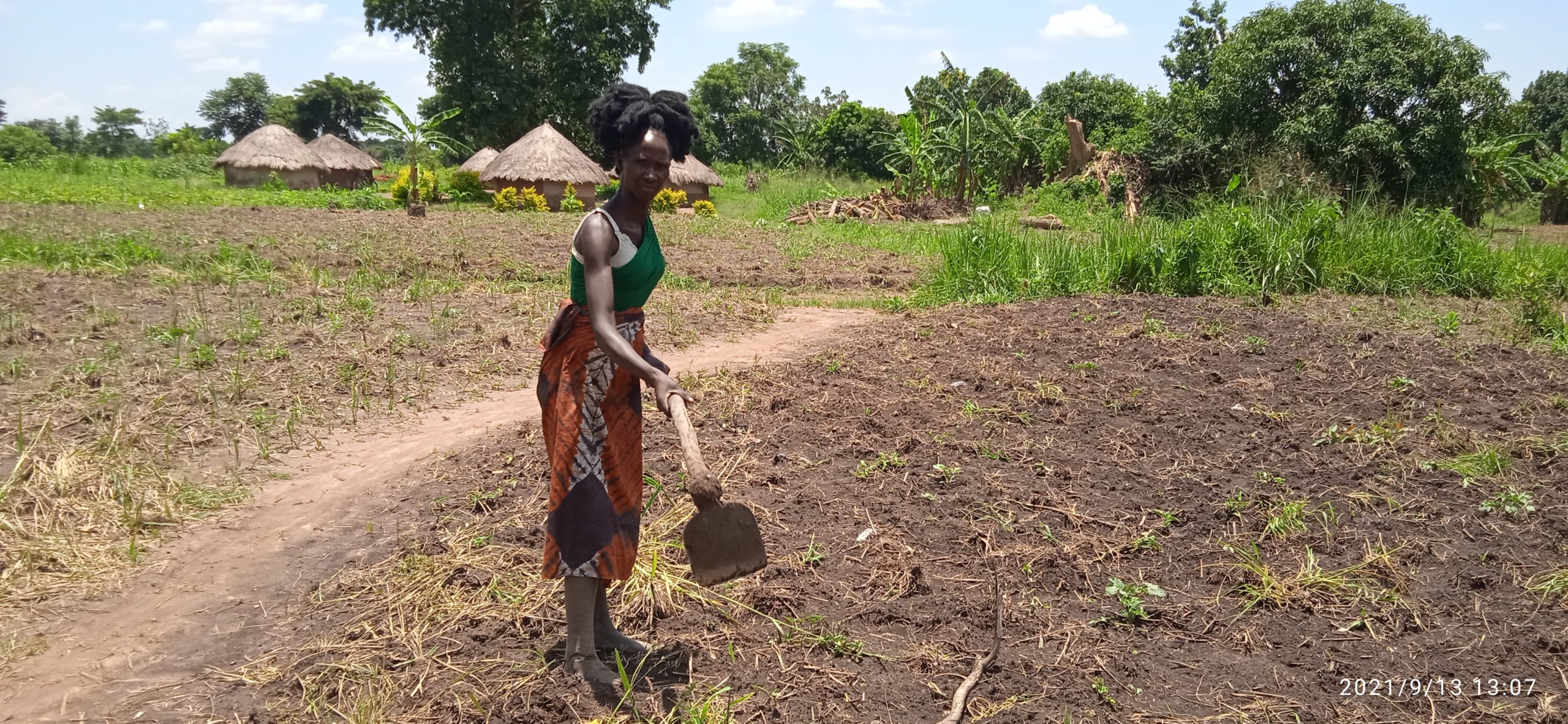

“I am 27 years old and believe my whole life is still for me to make. I cannot ask government to pay back my lost limb or messed up life. What am interested in however, is implore the government to critically evaluate the victim assistance clause enshrined in the International Mine Ban Treaty, which I was told obligates the State to look kindly on our affairs. I want to be able to use my hands, work, earn and put food in my family’s table. My children should be able to go to school beyond my level of education since my predicament prohibited me. “
Story of 1000 women survivors
Lost right foot and a baby brother riding on her back at 5 years from devastating landmines blast. Only started school thanks to a missionary benefactor who met her school dues primary through form three since her parents were equally wrestled down living in Internally Displaced Peoples (IDPs) camp early 2000s. Dropped out of school and would soon succumb to the pressure of being a girl-child experiencing so much withdrawn support. Found a young man and started a family. Regrettably, she separated last year and returned home with two children, boy 7 and girl 4 to live with widowed mother. Tilling the ground at a peasantry scale while eking a living.
Loss a limb an infant, five (5) years old going to fetch water at the well. After successful surgery and other medical rehabilitation, was able to walk with the help of artificial limb provided by the Hospital.
Parents took her to boarding school because they desired quality education for her. Recently completed Uganda Certificate of Education (U.C.E) at Koro Secondary School. Currently home helping family in the garden during this pandemic. Desire to join a vocational skills training in order to learn a trade that will provide occupation for future.
Growing up with limb loss was not so discomfiting in terms of her social life since her families, peers at school and community wholly accepted her the way she was. She is hoping that she will be able to continue living positive even as she prepares to encounter uncharted territories entering adulthood. Disability and segregation she never had to face but has heard persons with disabilities express pain of discrimination.

“It is not up to me, but my appeal to our government is to consider lending survivors of explosive ordnances and landmines a helping hand to cope with the difficult past we have gone through. “
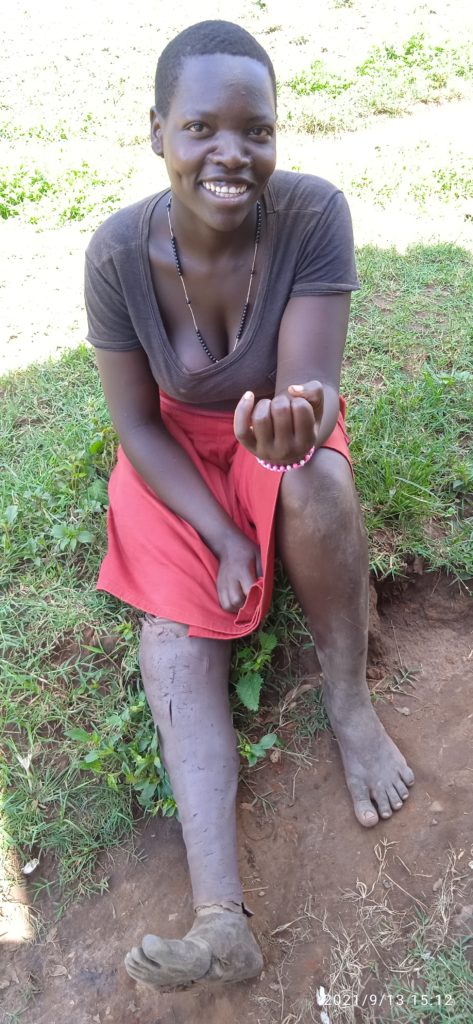


“I appeal to government to improve on budget allocation to this orthopedic department so that prosthesis is available for replacement for survivors and new amputees we keep receiving from other causes.
I am currently renting in town proximal to work place but I do not own any piece of land or house where I can farm or retire to while on leave, holidays or host visiting in-laws.
We are pleased that the prosthesis keeps us upright but lost past cannot be forgotten until government can openly come and compensate us with land and some capital to start off a better living.”
People who recover psychologically from the traumatic accident move from pragmatic acceptance to what we call acceptance with resilience. In contrast, people who do not recover psychologically from the traumatic accident move from pragmatic acceptance to what we term acceptance with resignation. They are resigned to the limb loss; feel depressed and bad about themselves. We have a handful of trained counselors who have had success handling high levels of trauma experienced from their peer in the community. Evidence of the resilience demonstrated by these survivors who accepted a fate of living without a limb and not committing suicide or going into depression is a vital indicator for our confidence. These ones have become ably roles models and change makers for those who are weak and for new cases of amputees struggling with accepting life of disability.
Henry an amputee himself, working with a Team of Technicians making, repairing and replacing artificial limbs (Prosthesis) enabling every patients is afforded a pair shoes when they receive services at Gulu Regional Referral Hospital.
Double amputee survivor wheels the streets of Anaka Town Northern Uganda to do welding and Fabrications in one of his workshops. Prior to Oscar’s accident, life was normal for the Family. At 18 years of age, while going home from the Internally Displaced Peoples camp in Olwyio, present day Nwoya district, Although it was 37 years ago last February 2, 2002 he remembers the way his life transformed then as intensely as though it happened yesterday.
Oscar opened the first welding workshop in Anaka Town in 2015, when there was no electricity. He trained over 70 youths who were on drugs, theft, hooliganism and transformed their lives over the past 6 years. Every wielding workshop owner in Anaka town was once his student making him a respectable figure in the industry. He owns two workshops where a couple of young men in Anaka town and Olwiyo Centre are employed. Oscar was elected a Councilor III Representative of Persons with Disabilities Olwiyo Sub County in the recently concluded general election 2021. He is ably looking after his family with returns from his different trades and engagement

“A few years ago names of survivors were written down across Acholi Sub region with the hope of our plight being addressed by government. Twice these records were submitted to respectable personalites in government but attempt to get credible feedback were futile.”
Yes, we are trying to move on with our lives thanks to the medical and psychological rehabilitation 20 years or so ago. Some of us have prosthesis, crutches, wheelchairs, others crawl, and most of these devices provided by Non-governmental Organisations.
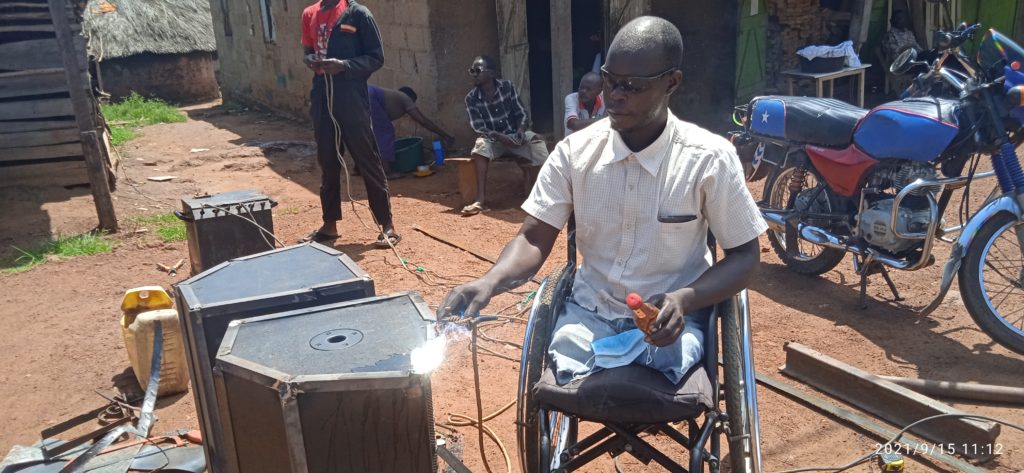
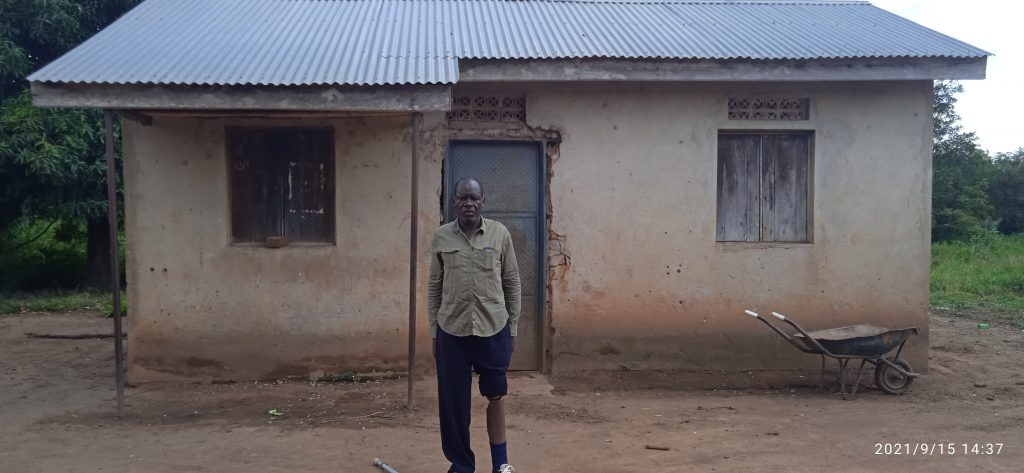

“It is not up to me, but my appeal to our government is to consider lending survivors of explosive ordnances and landmines a helping hand to cope with the difficult past we have gone through. “
The twenty years of conflict in northern Uganda left devastated the infrastructure, economy, and psyche of the population. With the restoration of peace, most people returned to their homes, further supported by the Government of Uganda’s Peace, Recovery, and Development Plan (PRDP) – a comprehensive strategy to improve the welfare of the people in the north with consolidation of state authority, rebuilding and empowering of communities, revitalization of the economy and peace building and reconciliation. However, resettlement proved challenging due to a number of barriers to sustainable livelihoods in northern Uganda, contributing to a seventy percent unemployment rate among youth and this figure is much higher for female youth and those with disabilities.
We implemented a Landmine Survivors Returning Home Project funded by NORAD through Humanist Action for Human Rights (HAMU-Norway) 2007 to 2011. Landmine survivors identified as severely disadvantaged at the time were selected to benefit from the basic housing project. 22 houses were built in different communities where the final beneficiaries come from including 15 women and 7 men
The dream to study, qualify as a professional, work in government or private sector was taken away the fateful day he stepped on landmine on the footpath to his home.
Living over 40 km in rural setting with no routine psychosocial support, remorseful, bitter and almost suicidal deterred him from continuing with school.
When age came he found a wife and started a family. He has children and even grandchildren. He is a peasant fortunate to rely of ox-ploughing for enhanced crop production. He is so thankful that the prosthesis enables him to effectively plough his way with the bulls like other persons without disabilities.
Special tribute to government partnership with AVSI facilitating the production and replacement of prosthesis for amputees requiring periodic assistive device

“Trust me, prosthesis is not human limb even if it serves the purpose for our case. I always have to bear the pain of abrasion on my stub and entire left leg after ploughing with ox-plough. Do I have a choice? I do not?”
“I have a family and many mouths to feed. I do not have skills training to search for a job but farming is bread basket. As I continue to toil the earth, I expect government to meet us some where if we survivors will ever feel justice is being delivered.”
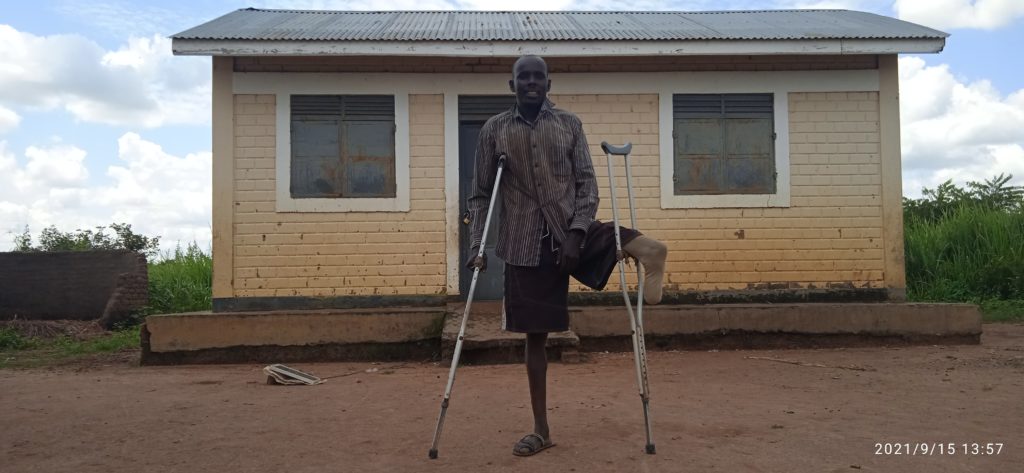

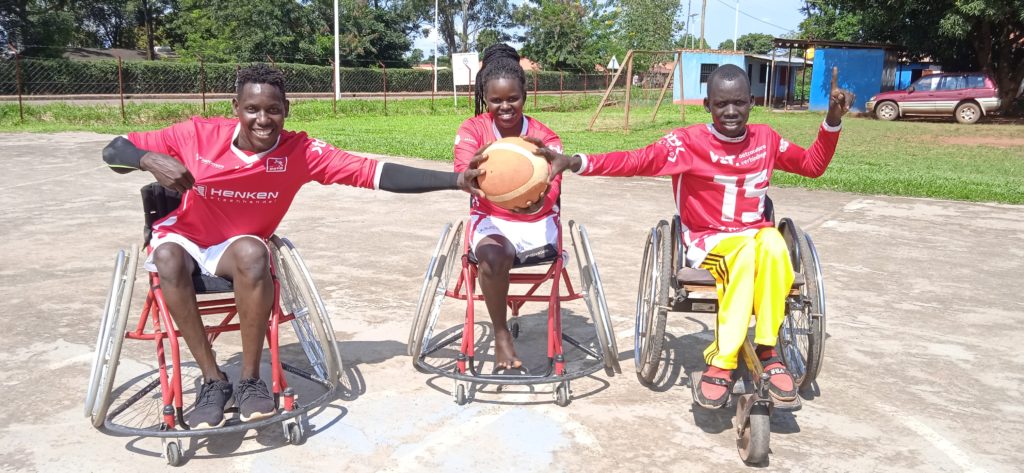
Suffering an amputation presents multiple problems for an individual, their family and friends. Psychological issues can be difficult to address and individuals can feel isolated leading to depression. Individuals following amputation at a low functional level often have to relearn how to perform daily activities with or without a prosthesis, and they tend to become more dependent on others, leading many amputees to experience decreased self-esteem. Others may return to a high functional level. Regardless, the rehabilitation care team must assess the functional and recreational goals of the patient to guide the treatment plan with the mission of creating an environment where there is no limit to what an amputee can accomplish.
Participation in varying activities has a profound effect on an amputee’s life. It has been shown that involvement in adaptive sports increases the quality of life for persons with disabilities by increasing self-esteem.
While not all persons with amputations will aspire to become elite athletes, those who participate in a sport and want to take their performance to the next level may find the maze of training and fitness information difficult to navigate. We were part of Uganda’s first Wheelchair Basketball team with two amputees male and female at the elite level playing Team Uganda East African Wheelchair Basketball Tournament, Kasarani 2019, Nairobi kenya.
